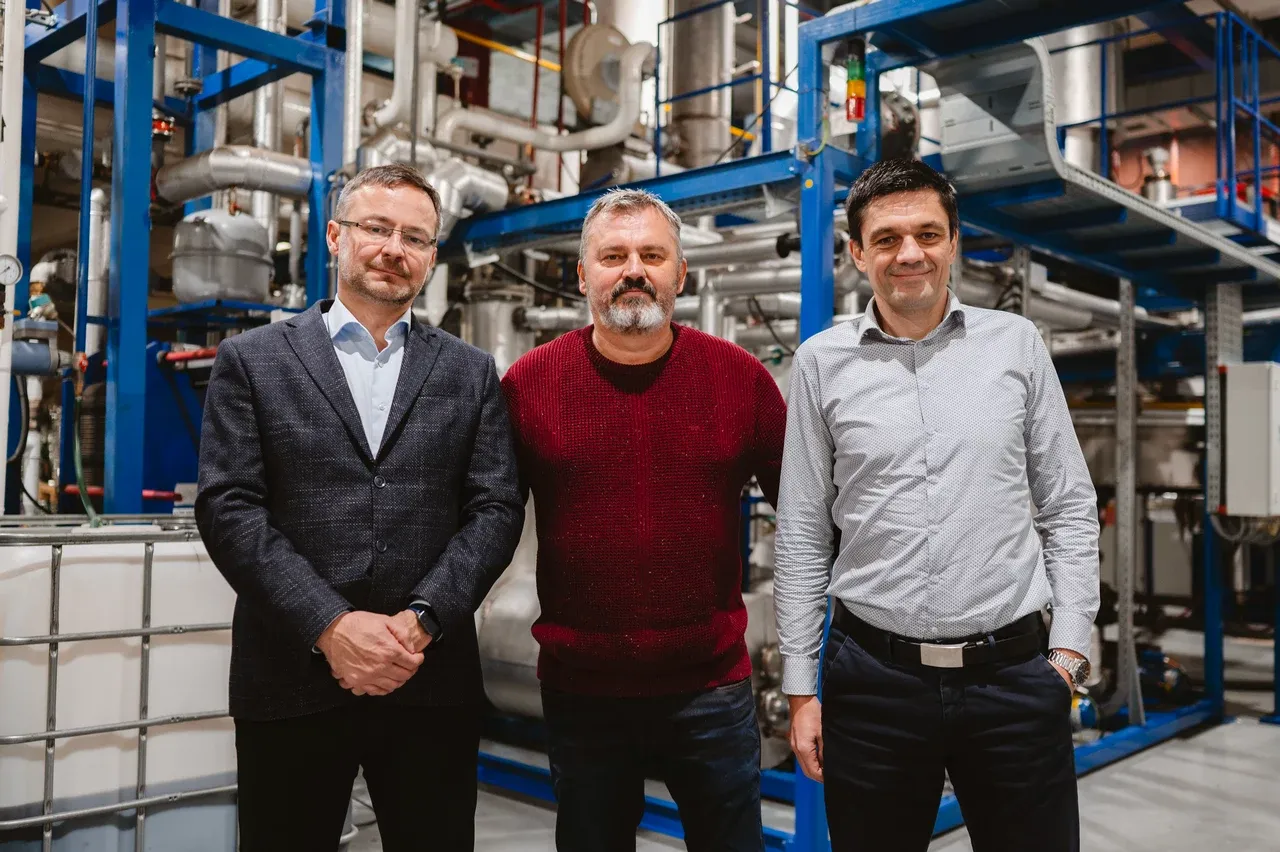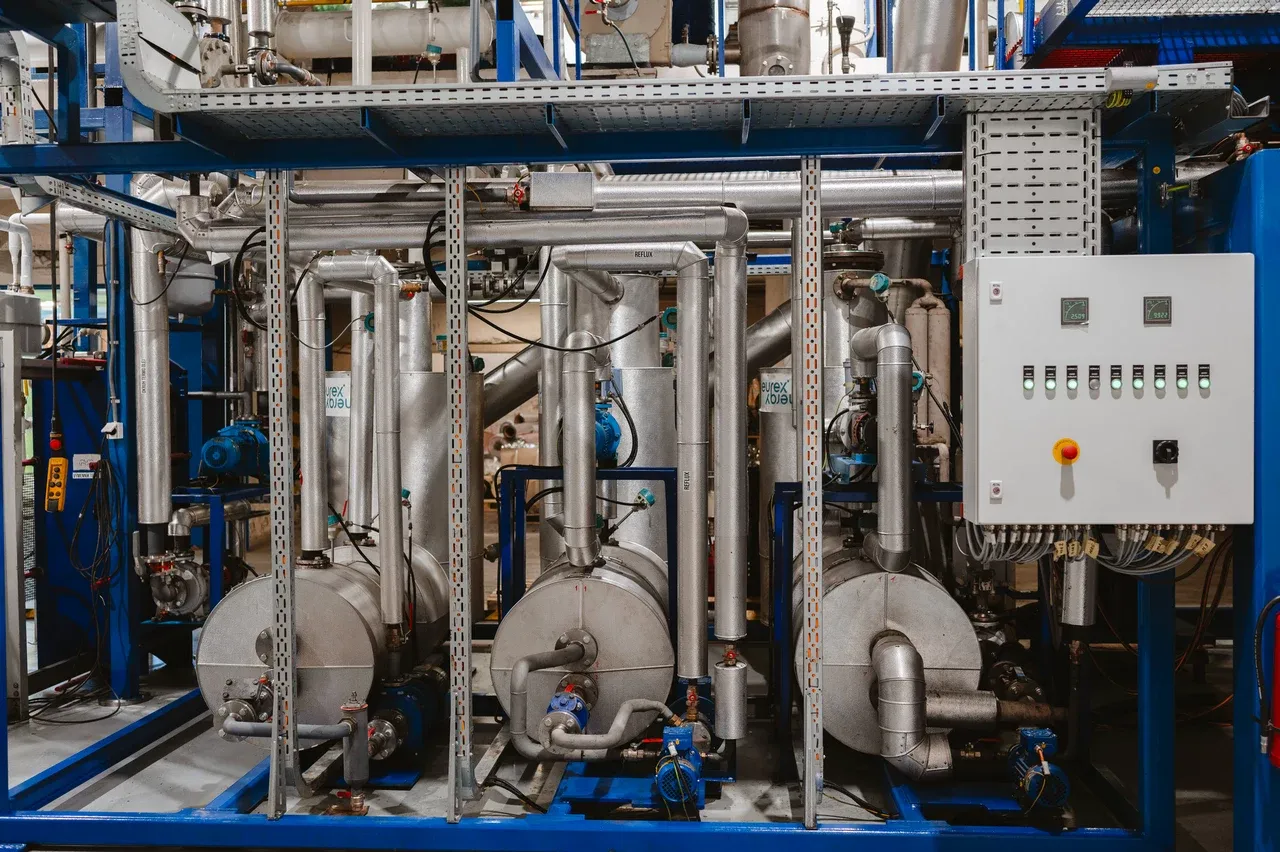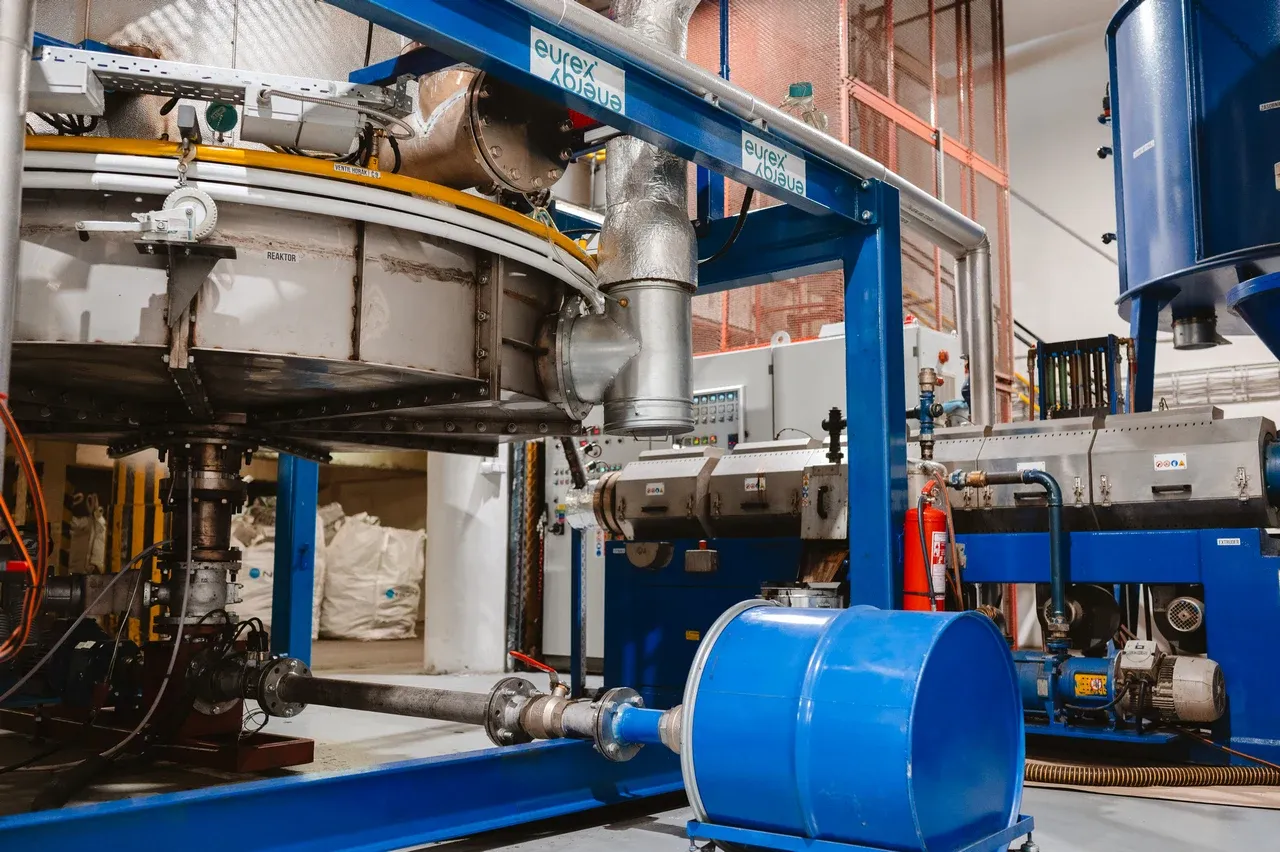Press Conference - Siemens / Eurex Energy
List of media partners and guests
-
Aktuality / ATP Journal / Dennik N / Euroactiv.sk / FinReport / HN / JOJ / Kosice dnes / Markíza / Mestské noviny SVIT / Nextech / Odpady-portal.sk / Pravda / Prešovský Štandard / Quark / RTVS / SITA / SME / Strojárstvo/Strojírenství / TA3 / TASR / Techbox / TouchIT / TREND / TV Poprad / tyzden.sk
The Slovak company Eurex Energy converts plastic into electricity. Thanks to the heart from Siemens, it works almost autonomously
Today, plastic waste is one of the biggest environmental problems. According to Eurostat, up to 60 million tons of plastic are produced annually in Europe alone, but only about 40% is recycled. On a global scale, it is even less than 10% according to the OECD.
Separation of waste or the backup of PET bottles recently launched in Slovakia help, but the problem with traditional mechanical recycling is the gradual degradation of the output material. The resulting plastic flakes can be used for further production only approximately two to three times.
The solution is offered by a new compact line for recycling and recovery of plastics by chemical-thermal processes, which was built by the Slovak company Eurex Energy of entrepreneur Vladimír Daniška after several years of intensive research and development in the field of waste processing. Chemical processes lead to the emergence of hydrocarbon fractions and even new raw materials by changing the chemical structure of plastic waste.



The resulting product from the Slovak Eurex Energy line
... certified secondary fuels can be suitable as a substitute for fuels from fossil sources, for example in electricity generators. After adding adsorbents, additional purification and filtration, they can be used again for the production of other plastics. Part of the non-condensable gases is also used for self-heating of the reactor of the recycling line, thanks to which the electricity consumption during recycling drops dramatically.
The specialists and technologies of Siemens helped
Chemical and mechanical engineers together with Siemens industrial automation experts have spent many months researching, developing and modifying the technology for the chemical recycling of waste plastics through thermal processes so that it is as environmentally friendly, automated and efficient as possible. The result of their efforts is a compact line built on a unique three-phase process. In the first, mechanical-thermal phase, the incoming waste is appropriately treated and freed from most of the water or other pollutants.
All polyethylene (PE) and polypropylene (PP) plastics can be recycled in any proportion, even with slight contamination up to 5% of their total weight. Plastics can come from municipal or industrial waste, but also directly from landfills and other sources. A melt is formed, which in the second phase is decomposed in the process gas reactor at a temperature of 430 ºC. The system developed by Eurex Energy has several advantages over similar solutions. The first is extremely compact dimensions. The entire technology fits into an area of only 150 m2 and is only 6 meters high, thanks to which it can be installed to a significantly higher number of customers than competing lines. In addition to removing heavy hydrocarbons and solid substances such as stone, sand, glass or clay, the line can also filter water-soluble pollutants.
"In our case, the output that comes to the reactor is not treated mixed plastic waste (recycled), but melt. It is essentially a thermally prepared intermediate product freed from moisture and most problematic pollutants. We remove them from the recycling process, so they do not contaminate the final products,"
explains Vladimír Daniška, head of Eurex Energy and adds:
"Another big advantage is energy efficiency. Heat processing of plastics is energy intensive. In our solution, the initial heating of the polymer to more than 200 ºC occurs in the extruder and not in the reactor, which is more energy efficient, because we supply energy mainly by friction and not by external heat. The use of gas infrared heaters reduces gas consumption and minimizes air pollution by emissions."
The Eurex Energy line can also work continuously, so it has no temperature fluctuations. This increases the quality of the output recycled material, which does not degrade during the start-up and interruption of the line:
"In our case, the prerequisite is to obtain outputs in virgin quality, even without further processing, or only with the addition of adsorptive agents and filtration,"
reminds V. Daniška.



Key partners of a unique project
Partners Eurex Energy, Chemosvit Group and Siemens played a key role in the research and development of technology for continuous chemical recycling of plastics by thermal processes.
The Chemosvit group is ideal for the deployment of the Eurex Energy pilot line because it produces a large volume of waste and consumes a lot of energy. The group also includes Chemosvit Strojchem, which is engaged in engineering production and will be responsible for the production of lines for chemical recycling of plastics for other customers from all over the world.
The second key partner is Siemens, which supplies the line with control systems ensuring its autonomy: "When introducing automation and digitization for this type of technology, it is important to use modern control systems that contain libraries and blocks necessary for controlling continuous chemical processes, have a long service life and a guaranteed long-term support. The system meets all these criteria
Siemens Simatic PCS 7, which is the control center of the line," says Marián Filka from the Digital Industries department at Siemens. Simatic PCS 7 has extensive possibilities for storing and trending process data. The obtained data can be used to optimize operations, including energy consumption. The Eurex Energy recycling line also uses other Siemens products and technologies – Sitrans sensors for measuring flows, temperatures or pressures and Siwarex strain gauges for weighing mixtures during production. Sinamics frequency converters and drives and Scalance or Sinema components for remote line management and diagnostics are also included.
The Slovakian Siemens team also provided extensive support and training for Eurex Energy prior to the project work on the Simatic PCS control system and the Sitrans process device, as well as in the next phases of the project – during start-up, programming and revitalization of the control system.
"When I met with the experts from Siemens, I told them that we need to achieve the highest possible level of automation. For several months, we have been explaining how the individual processes should look and what must be preserved in order for the output product to be of high quality. The result is that today you don't need ten people to operate the line, but two are enough, and the vision is to achieve complete autonomy."
... points out Daniška. Automation can not only save costs for customers who will use Eurex Energy lines around the world, but also maintains a consistent quality of outputs.



The pilot line also helps in practice
Today, the fully functional Eurex Energy line in the Chemosvit area serves both to present the solution to potential customers of the Slovak company from abroad, but also helps the chemical giant to recover its waste material. Thanks to this, Chemosvit significantly reduced energy costs, as it uses the fuel produced by the line to produce electricity. The estimated return on investment in the line is approximately 10 years.
New opportunities are also opening up for the Chemosvit Strojchem subsidiary.
"Every year, we can produce dozens of lines for continuous plastic recycling for Eurex Energy customers from all over the world,"
says Martin Ľach, a member of the Chemosvit group's board of directors. It does not have to be only industrial enterprises from abroad, but also smaller or larger cities and towns from Slovakia. They will use plastic from yellow waste containers.
"Carrying waste for processing at a distance of 250 kilometers or more is not only unecological, but also unprofitable. Thanks to our line, municipalities and cities can reduce their carbon footprint and, in addition, produce their own energy, which can be used for public lighting or other purposes,"
adds Vladimír Daniška.
Based on the European Union regulation, part of the waste will have to be converted into energy as early as 2027. However, countries lack the capacity and technology to process plastics. Half of the waste intended for recycling is therefore exported to third countries today. In the past, most of it went to China, but it has already banned the import of plastic waste. "Chemical recycling in the EU will help prevent plastics from having to be burned or ending up in landfills," Daniška concludes.
List of media partners invited
List of media partners invited
| EDITORIAL | NAME |
|---|---|
| Aktuality | Marek Nemec alt. Jan Trangel |
| ATP Journal | Anton Gérer |
| Dennik N | Greško alt. Hrivňák |
| Euroactiv.sk | Pavel Nikodem |
| FinReport | Robert Juriš |
| HN | Tomáš Garai |
| JOJ | Maja Pavlíková |
| Kosice dnes | Ladislav Miko - veduci |
| Markíza | Marek Vnenčák |
| Mestské noviny SVIT | Zuzana Dobranszka |
| Nextech | Ľuboslav Lacko |
| Odpady-portal.sk | Radovan Potočár |
| Pravda | Tomáš Zemko |
| Prešovský Štandard | Rastislav Ovšonka |
| Quark | |
| RTVS | Ivana Ratkovská |
| SITA | Martina Biroova - veduca |
| SME | TBD |
| Strojárstvo/Strojírenství | Tibor Šuľa |
| TA3 | Jozef Slivenský |
| TASR | Adriána Hudecová |
| Techbox | Števo Porubský |
| TouchIT | Ondrej Macko |
| TREND | Branislav Toma |
| TV Poprad | |
| tyzden.sk |
Technology
ABOUT US
we are on social NETWORK
Eurex Energy, s.r.o. capitalized on its own development using foreign knowledge and experience in the production of new technology in the use of renewable and alternative energy sources, the EUREX ECO 01 equipment for the recovery of mixed waste plastics in the form of chemical recycling.ed.

